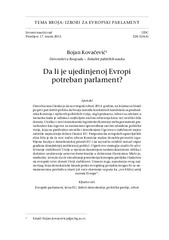Приказ основних података о документу
Does the United Europe need a parliament ?
Da li je ujedinjenoj Evropi potreban parlament?
| dc.creator | Kovačević, Bojan | |
| dc.date.accessioned | 2021-04-02T12:10:48Z | |
| dc.date.available | 2021-04-02T12:10:48Z | |
| dc.date.issued | 2015 | |
| dc.identifier.issn | 1820-6700 | |
| dc.identifier.uri | http://rfpn.fpn.bg.ac.rs/handle/123456789/497 | |
| dc.description.abstract | The major argument of this article is that the European elections 2014, that for the first time provided voters opportunity to actually choose European Commission's future political leadership, came too late. The elections took place in the moment when the decision on the best way of dealing with the crisis had already been made. Therefore, new democratic legitimacy of the European Commission should be seen first and foremost as an excuse for uninhibited implementation of a concrete political vision, which the EU's most powerful member states previously determined and secured by adopting Fiscal compact. The EU's governing elites' major assumption is that the novelties in the way the Commission is elected will at least to a certain degree bring back the lost illusion of the EU's democratic nature and thus undermine the growing dissatisfaction and resistance of citizens to the so far established anti-crisis policy. If this strategy proves to be successful the EU would regain stability at the expense of further destruction of member states' constitutional democracy. It is, however, not probable that this attempt to simulate transfer of the party government model to the European level will bring back stability to the Union. Instead it may turn out that this latest democratic disguise of the European project will have as an unintended consequence further deviation from the road toward the 'ever closer Union among European peoples'. | en |
| dc.description.abstract | Osnovna teza članka je da su evropski izbori 2014. godine, na kojima su birači po prvi put dobili priliku da biraju između konkretnih kandidata za predsednika Komisije i njihovih političkih vizija, stigli prekasno. Izbori su održani u trenutku kada je odluka o najboljem načinu rešavanja krize već uveliko bila doneta. Utoliko i novi demokratski legitimitet Komisije treba posmatrati prevashodno kao izgovor za neometano sprovođenje sasvim određene političke vizije, koju su prethodno utvrdile i donošenjem Ugovora o stabilnosti trajno zaštitile najmoćnije države članice EU. Pretpostavka evropskih upravljačkih elita bila je da će nov način izbora Komisije makar donekle povratiti izgubljenu iluziju o demokratskoj prirodi EU i na taj način oslabiti rastući otpor građana dosadašnjoj antikriznoj politici. Uspeh ove strategije značio bi učvršćivanje stabilnosti Unije u njenom današnjem nedemokratskom obliku i dodatno urušavanje ustavne demokratije u državama članicama. Malo je, međutim, izvesno da će simuliranje prenošenja koncepta partijske vladavine na evropski nivo doneti Uniji stabilnost. Umesto toga, nanošenje ovog najnovijeg sloja demokratske fasade preko evropskog projekta mogao bi za nenameravanu posledicu imati još veće skretanje sa puta ka 'sve bližoj uniji naroda Evrope'. | sr |
| dc.publisher | Univerzitet u Beogradu - Fakultet političkih nauka, Beograd | |
| dc.rights | openAccess | |
| dc.source | Godišnjak Fakulteta političkih nauka | |
| dc.subject | European Parliament | en |
| dc.subject | EU crisis | en |
| dc.subject | democratic deficit | en |
| dc.subject | political parties | en |
| dc.subject | elections | en |
| dc.subject | Evropski parlament | sr |
| dc.subject | kriza EU | sr |
| dc.subject | deficit demokratije | sr |
| dc.subject | političke partije | sr |
| dc.subject | izbori | sr |
| dc.title | Does the United Europe need a parliament ? | en |
| dc.title | Da li je ujedinjenoj Evropi potreban parlament? | sr |
| dc.type | article | |
| dc.rights.license | ARR | |
| dc.citation.epage | 43 | |
| dc.citation.issue | 13 | |
| dc.citation.other | 9(13): 23-43 | |
| dc.citation.rank | M51 | |
| dc.citation.spage | 23 | |
| dc.citation.volume | 9 | |
| dc.identifier.doi | 10.5937/GodFPN1513023K | |
| dc.identifier.fulltext | http://rfpn.fpn.bg.ac.rs/bitstream/id/322/494.pdf | |
| dc.type.version | publishedVersion |

